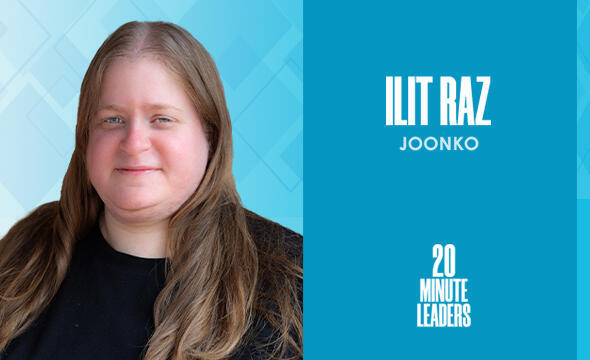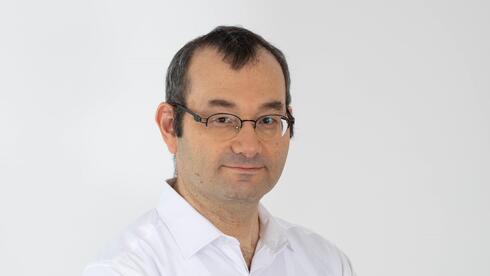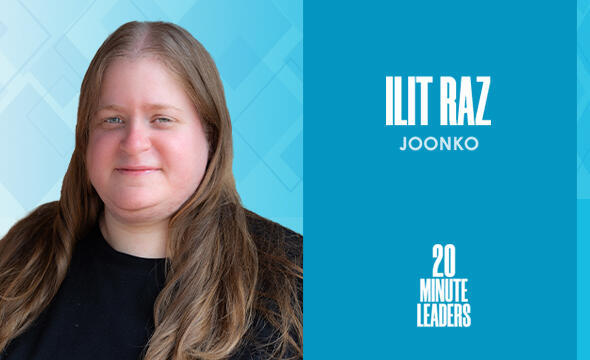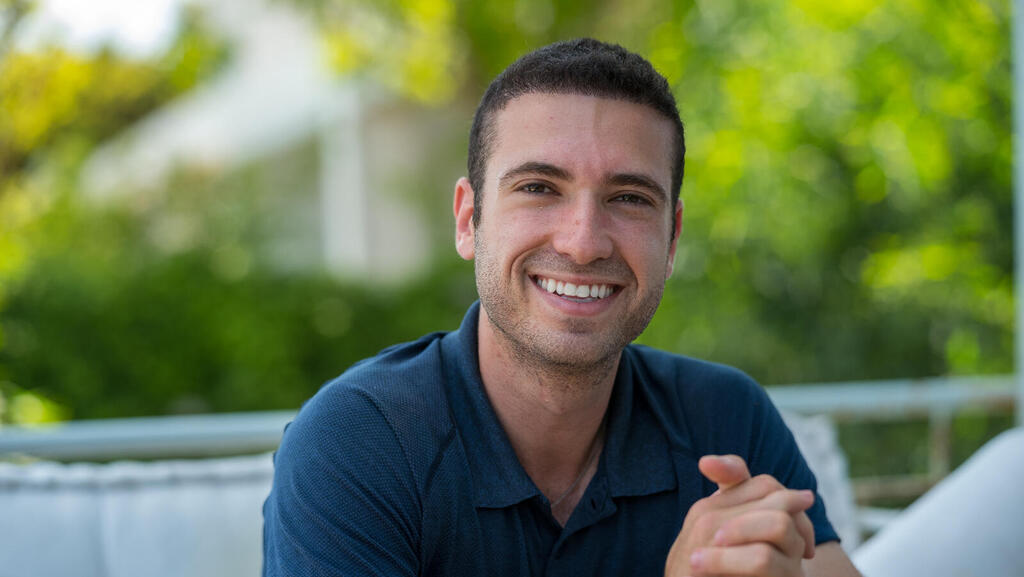
20-Minute Leaders
“The longer vision is to focus on how we retain underrepresented talent.”
Learning about the challenges of retaining talent from underrepresented groups helped spur Ilit Raz, founder and CEO of Joonko, to be part of the solution.
Learning about the challenges of retaining talent from underrepresented groups helped spur Ilit Raz, founder and CEO of Joonko, to be part of the solution. She had the desire to start her own company, and while her first and bigger idea in the diversity space didn’t generate much interest, finding a specific pain point to focus on resonated with people more, Raz explains. Joonko helps U.S. companies recruit qualified minority candidates by pooling together the second-choice applicants from other job openings. Raz shares that providing a cultural solution in a country she didn’t grow up in has been a challenge. Framing the DE&I conversation in business language and goals was also difficult, but she says that she and her team have learned a lot. She says her vision for Joonko is to become part of the entire process of hiring, retaining, and promoting underrepresented talent.
It’s a pleasure to have you here talking about underrepresented talent, recruitment, and diversification at Joonko. Tell me about yourself and how you got into this world.
Most of my career, I've been on the tech side. I started my career in 8200 as an engineer. I moved to product management. I joined a group of females in product management and was more exposed to gaps in the industry that I was not aware of. I became more aware of how challenging it is to recruit underrepresented minorities and the things that happen along the way that make it so challenging for them to stick within a corporation. It was an intersection between this knowledge and my appetite to start my own thing.
What was this world that we were living in then?
It was very different from what it is now. It was a pre-Black Lives Matter, George Floyd world. It's almost seven years ago. The first handful of companies were starting in this space. I tried to pitch the idea back then to 30 to 50 different VP of HR in Israel. All of them were having a hard time relating to it. The idea was also very different from what we do today. Think about trying to sell the full Salesforce suite of products on day one that Salesforce started. It was a long journey of understanding how you sharpen your pencil to the exact pain point you want to solve and how you solve it in the short term, with a longer vision of where you want ahead.
On the website, the first sentence is: “Where silver medalists are matched with golden opportunities.” Elaborate on that.
Silver medalists in the talent acquisition world are people who got to the finish line but did not get the job. We hear, "It's between you and another person." Then one person has been picked and the other one is second place. Our solution is basically combining the efforts between all the companies on the platform: those silver medalists they have that are also underrepresented are combined into one pool, allowing them to tap into really good opportunities after not getting the job they originally applied to.
What was the approach that you took with Joonko to help change this landscape?
I'll share a quick story on how the idea for the product came up. We were looking for a data scientist. Got tons of women applying. I was consulting with one of our angel investors who used to lead Intuit Israel, and she said, "You probably don't get any women." I said, "We actually got tons of them, and they are really good." She said, "Everyone that you like, that is really good, but you ended up picking someone else, please send them to Intuit." So I would email and say, "I was really impressed. Intuit is looking for more people like yourself. Go ahead and apply." Intuit ended up hiring three or four of those.
We basically built out this really small use case into a scale version. Every talent that gets to the end of the funnel and is underrepresented gets the opportunity to join a mutual pool and get offered in other companies within the pool.
What was the underlying understanding that led to, "Okay, now I'm ready to go big on this"?
Three things that were happening in parallel. The realization that what we started with was too big of a solution. Second, every time we spoke about DE&I, we were rerouted to a conversation for help with recruiting. And the story that I just shared. I said, "If I could do this at scale, this can be really amazing and tick the other boxes."
I took a plane maybe a week after that aha moment and talked with 50 different companies in the States and pitched the idea. Suddenly, I started to feel what I didn't feel with the previous idea: "People want it. It resonated with people.” Then it pushed me to "We are doing it."
Today, we work with close to 200 companies across the US. Anything from steel manufacturing all the way to banks, credit card companies, a lot of B2C products: AmEx, Porsche, Nike, Adidas.
From an entrepreneur's vision perspective, what is the success of Joonko?
Today we are focused on the top of the funnel, when a person turns from an applicant to a candidate. The longer vision is to focus on how we make this candidate turn into an employee and how we can retain them in the company. A lot of companies put a lot of effort and money into recruiting more black, white, women, Latinx, and veterans, but they don't know how to keep them in the company. For me, the longer vision and the success would be to see a full cycle of support for companies around DE&I, from the moment that you apply to a company to you got hired and how you get promoted, how you stay in the company and become a valuable asset, based on data.
What are the main points of intervention that are most relevant for Joonko to come in to such a process?
Along the whole process, from making sure your job description converts the right talent, making sure that your interview process is inclusive enough, making sure that the questions you ask are equal between all candidates.
We connect to your applicant tracking system, the platform that you manage your recruiting processes. Through this, we get all the data; we analyze different patterns of behaviors and allow us to generate those insights to our customers, not just about the candidates that we bring in but also all through the process and how to make it a more inclusive process.
What are the different challenges that you've had to deal with on this journey?
It's learning how to talk about this subject, on one hand in a sensitive way, but also in a business way. This is not just fluff, but this can actually generate business KPIs, good ROI. This is one thing that we had to evolve into our language and how we talk to customers.
Obviously, the challenge of selling to a country that I didn't grow up in; being the white person from Israel trying to pitch the black woman who grew up in Atlanta, that's been a big challenge. We have grown since then. We are selling a cultural solution, which requires for me and the Israeli team to be way more culturally aware.
Did you observe any changes in the landscape over these last few years?
A lot of things happened. Black Lives Matter boosted the employees that were pushing companies, saying, "What do you do for DE&I? Please share the numbers with us. We want to see more black, Latinx, women in the organization." What I've seen even before that, with Trump being elected, was more and more CEOs of big companies saying, "We need to take care of the communities we live in and make sure we embed more diversity practices into the organization, even if our government doesn't necessarily push towards it." That really, really shifted the mindset. With diversity, it's a little bit harder to say, "It's not a priority for us."
What's up next for Joonko in the near future?
First, like every company, surviving in this crisis. But we are in a really good position. The plan this year is to expand, about tripling our current presence in the US; potentially looking into some acquisition opportunities. Growth-growth-growth is our biggest focus for the next 12 to 18 months.
Michael Matias, Forbes 30 Under 30, is a Venture Fellow at Innovation Endeavors as well as investment Venture Partner at Secret Chord and J-Ventures. He studies Artificial Intelligence and Human-Computer Interaction at Stanford University, and was an engineer at Hippo Insurance. Matias previously served as an officer in the 8200 unit. 20MinuteLeaders is a tech entrepreneurship interview series featuring one-on-one interviews with fascinating founders, innovators and thought leaders sharing their journeys and experiences.
Contributing editors: Michael Matias, Megan Ryan















